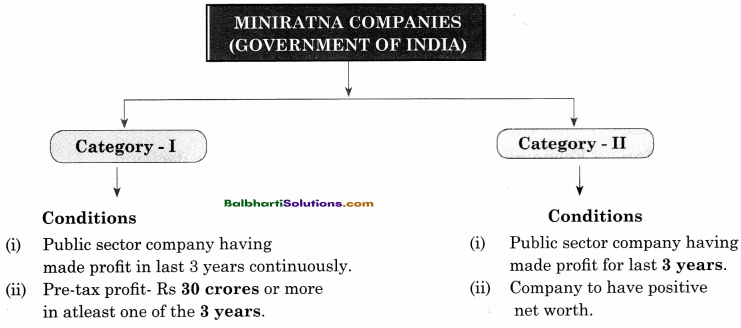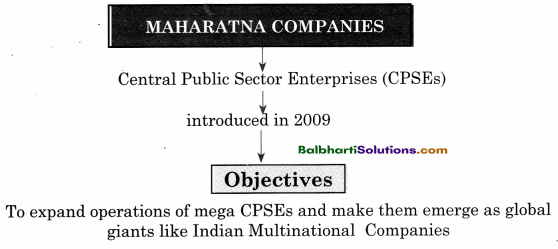By going through these Maharashtra State Board Class 11 Economics Notes Chapter 9 Economic Policy of India Since 1991 students can recall all the concepts quickly.
Maharashtra State Board Class 11 Economics Notes Chapter 9 Economic Policy of India Since 1991
→ Objectives of Economic Policy of 1991
- Plunge Indian economy to arena of Globalisation.
- Bring down rate of inflation.
- Correct the disequilibrium in balance of payments.
- Acquire higher economic growth rate.
- Build sufficient Foreign Exchange Reserves.
- Establish international trade relations without any restrictions.
- Increase the participation of private sector.
- Achieve economic stabilisation and reduce fiscal deficit.
![]()
→ Features of the Economic Policy of 1991:
- Delicensing
- Abolition of Monopolies and Restrictive Trade Practices (MRTP) Act
- Encouragement to small sector
- Encouraging Foreign Investment – (FDI)
- Reducing role of Public Sector
- Trade Liberalisation – SEZ and AEZ
- Reforms in Insurance Sector – IRDA
- Reforms in Financial Sector
→ Components of New Economic Policy:
- Liberalization
- Privatization
- Globalization

→ Liberalization — Economic freedom or freedom for economic decision.
Measures Taken For Liberalization:
- Flexibility of Interest rate
- Freedom for expansion of industries
- Abolition of Monopolies and Restrictive Trade Practices
- Reforms in FERA
- Investments in infrastructure
- Encouragement to foreign technology
- SEBI (Securities and Exchange Board of India)
![]()
→ Privatisation→ Privatisation means transfer of ownership from public to private sector.
Measures Taken For Privatisation:
- Disinvestment
- Dereservation policy
- Establishment of BIFR (Board of Industrial and Financial Reconstruction)
- Creation of National Renewal Board (NRB)
- Navratna Status
→ Navratnas:
- IOC : Indian Oil Corporation
- ONGC : Oil and Natural Gas Corporation
- HPCL: Hindustan Petroleum Corporation ltd
- BPCL: Bharat Petroleum Corporation Ltd
- IPCL: Indian Petrochemicals Corporation Ltd
- VSNL : Videsh Sanchar Nigam Ltd
- BHEL: Bharat Heavy Electricals Ltd
- SAIL : Steel Authority of India Ltd
- NTPC : National Thermal Power Corporation Ltd
→ Miniratna Government Of India:
Category – I
Conditions:
- Public sector company having made profit in last 3 years continuously.
- Pre-tax profit- Rs 30 crores or more in atleast one of the 3 years.
Category – II
Conditions:
- Public sector company having made profit for last 3 years.
- Company to have positive net worth.

![]()
→ Maharatna Companies:
Central Public Sector Enterprises (CPSEs)
introduced in 2009
Objectives:
To expand operations of mega CPSEs and make them emerge as global
giants like Indian Multinational Companies

→ Globalization:
- Globalization means the creation of global economy. OR
- Integrating an economy with the world economy.
→ Measures Taken For Globalization:
- Removal of quantitative restrictions
- Encouragement to Foreign Capital
- Convertibility of Rupee
- Foreign collaboration
- Long term trade policy
- Encouragement to Exports
→ Evaluation of Economic Policy of 1991 :
Major Achievements:
- Revolution in IT Sector
- Solves the problem of scarcity
- Improvement in Financial Facilities
- Diversification of cropping pattern
- Improvement in educational standards
- Increase in Exports

![]()
→ Major Failures In Economic Policy 1991:
- Lack of Self Sufficiency
- Unemployment
- Adverse effect on domestic market
- Neglects Welfare Aspect
- Affects poor farmers
- Unhealthy Competition

Word Meaning:
crisis – time of severe difficulty; socialistic – owned by society as a whole, momentum – gained, unshackle cobweb – set free, bureaucratic – government administrative, plunge – jump, disequilibrium – lack of stability in relation to demand and supply, fiscal deficit – total expenditure is in excess of total revenue, delicensing – cancellation of government license, strategic – long term, hazardous – dangerous, merger – to combine, sick – serious problem suffered by organisation or company, abolished – stopped, era – period, retrenched – to cut down, globalisation – working world wide, integrating – combining, barriers – obstacles, quantitative restrictions – to stop something in terms of quantity, tariff rates – tax rate, collaboration – to associate, revolution – to bring major change, diversification – to change the line of business/to expand, scarcity – short supply, self sufficiency – to be independent, cheaper – low in price, unnoticed – not observed, exhorbitant – extremely high, back seat – to take no interest/less importance, compelled – to force to do something.